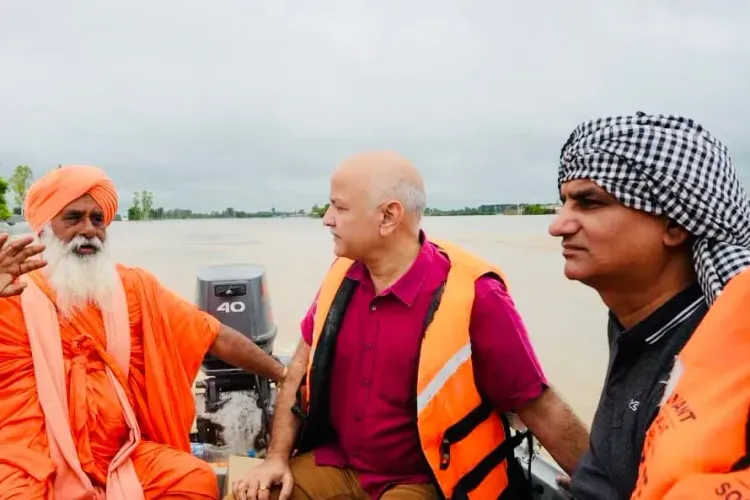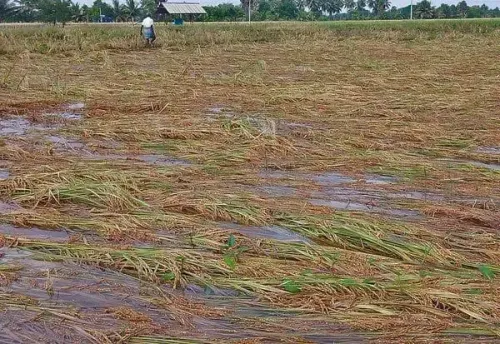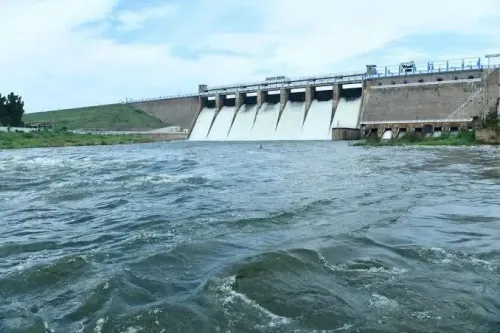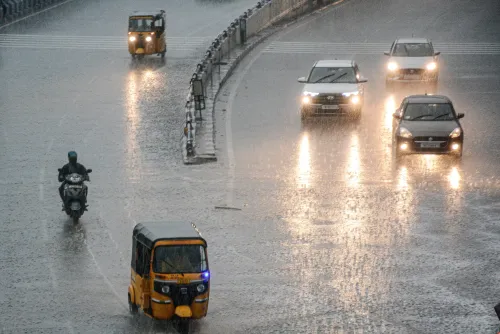What Acts of Generosity Are Emerging Amid Punjab's Flood Crisis?

Synopsis
Key Takeaways
- Punjab is experiencing unprecedented flooding, impacting 23 districts.
- Humanitarian organizations are working tirelessly to provide essential aid.
- The resilience of the affected communities is remarkable, showcasing the spirit of compassion.
Chandigarh, Sep 3 (NationPress) As individuals navigate the waist-deep flood waters caused by the southwestern monsoon, numerous humanitarian and youth organizations are tirelessly engaging with rural communities across at least 19 affected districts in Punjab. Using boats and tractors, these teams are delivering essential supplies including food, clean water, medications, hygiene kits, and shelter items to thousands, predominantly the elderly, enduring relentless rain.
A recent visit by the global charity Khalsa Aid International to a farm submerged in seven to eight feet of water in Dera Baba Nanak village, Gurdaspur, highlighted the urgent need for assistance. An elderly woman, overwhelmed with emotion, expressed gratitude, stating, “After four days, you came to us as God.”
This couple has been residing on the upper floor of their home without essential provisions. They had originally escaped the flood's advance, leaving the elderly couple and their livestock behind.
When informed by the Khalsa Aid team of their rescue, the woman firmly replied, “We are staying here to care for our livestock. We must live and die here.”
Despite the dire situation, they remain hopeful of restoring their home and replanting their crops.
Thousands of farming families, similar to this couple, have lost rice paddies ready for harvest, along with the rice, wheat, and grains stored in their homes.
Farmer Avtar Singh lamented, “We also lost six buffaloes,” as he copes with significant losses, including personal belongings, and strives to rebuild his life.
Punjab is experiencing its most severe floods in four decades, with numerous social organizations collaborating with the Indian Army, the National Disaster Response Force (NDRF), and local authorities to provide Guru's ‘langar’ (free meals) and shelter.
The Punjab Revenue, Rehabilitation, and Disaster Management Minister, Hardeep Mundian, confirmed that the state is facing one of the most extensive floods in recent decades, impacting 23 districts, claiming 30 lives, and affecting over 354,000 individuals.
According to the AAP minister, 1,400 villages have been submerged. Severely impacted areas include Gurdaspur (324 villages), Amritsar (135), Hoshiarpur (119), Kapurthala (115), Mansa (108), Ferozepur (93), Pathankot (82), Fazilka (72), Jalandhar (62), and Tarn Taran (66 villages).
The AAP government has designated Punjab a disaster-hit state. Torrential rainfall and subsequent water releases from three major dams—the Bhakra, Ranjit Sagar, and Pong—to manage abnormal water levels have severely affected the floodplains of Punjab, impacting 148,590 hectares of farmland.
Crops such as wheat and rice have experienced substantial damage. Eco-warrior Sant Balbir Singh Seechewal, renowned for reviving the nearly extinct 160-km-long Kali Bein rivulet sacred to Sikhs, has been tirelessly working on the ground in the most remote villages for over three weeks.
Before dawn, Sant Seechewal and his team of volunteers, equipped with protective gear, navigate the high waters of the Mand region of Sultanpur Lodhi, which is severely affected by the swollen Beas River, to provide food to families trapped in the flood.
Every day, he and his volunteers cover a radius of 32 km in 10 hours, reaching every household in Mand, an island on the Beas River.
Accompanied by former Delhi Deputy Chief Minister Manish Sisodia in relief efforts, Sant Seechewal reported that 30% of residents in the Mand area have evacuated to safer locations—either to relief camps or to stay with relatives.
“Those who remain need medications, drinking water, tarpaulins, mosquito nets, and basic supplies, and we are supplying them. Our relief stock is sufficient to assist,” Padma Shri Seechewal affirmed.
He advised that genuine help should focus on the post-flood period, suggesting that once the waters recede in 15-20 days, affected individuals will begin returning home to repair their houses and desilt fields. This will be the time for significant support.
His organization plans to commence repairs on river embankments and desilting of the river.
“At that point, they will require earth-moving machinery and materials for reinforcing embankments. Those wishing to assist the distressed should save their energy and sympathy for future initiatives,” he added.
In his signature maroon robes, Sant Seechewal can be seen urging volunteers to prioritize relief for children and the elderly. He is also involved in feeding abandoned cattle stranded in flooded fields and dogs left behind in houses.
He and his team have played an instrumental role in relocating families and their livestock to safety.
Sant Seechewal personally fills sandbags, transporting and placing them at breaches in the river. Volunteers from the Shiromani Gurdwara Parbandhak Committee (SGPC), regarded as a mini-Parliament of Sikh religious affairs, are also moving from village to village, providing temporary shelters and operating community kitchens around the clock for stranded villagers.
AAP Rajya Sabha MP Ashok Kumar Mittal has allocated Rs 20 lakh to procure water tankers for supplying clean drinking water to the displaced populace. His office indicated concern that once floodwaters subside, the affected individuals may face a shortage of safe drinking water due to damage to tube wells and other water sources.
In a video showcasing the devastation, former cricketer-turned-AAP Rajya Sabha MP Harbhajan Singh shared on X, “When volunteers delivered relief materials, a flood-affected family, despite losing nearly everything, prepared tea and offered it to the volunteers. That’s the spirit of Punjab. Rab de bande.”
This video has gone viral on social media, garnering admiration and respect. Despite the devastation, the resilient and generous spirit of Punjab shines through, as individuals cook ‘langars’ in floodwaters, distribute necessities to every household, and establish medical camps for the sick and injured.
(Vishal Gulati can be contacted at vishal.g@ians.in)









